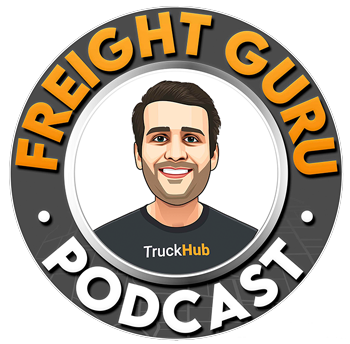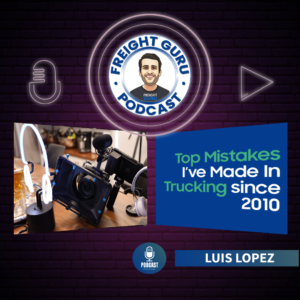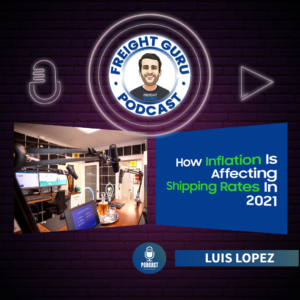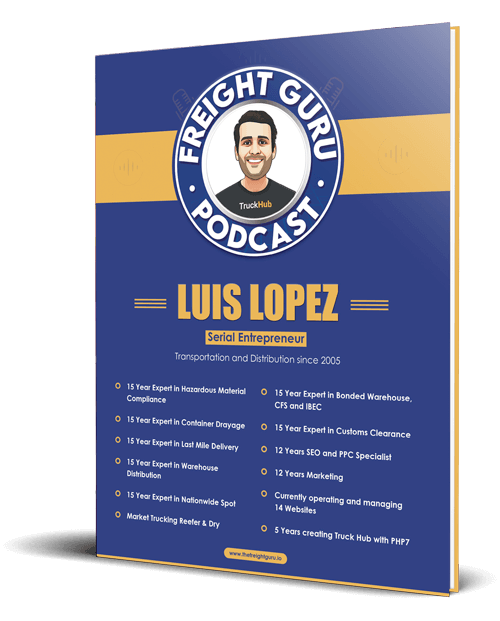In this week’s episode, the Freight Guru, Luis Lopez goes over how large brokers outside South Florida are prioritizing local drayage carriers and their growing demand in the market.
Listen to the Full Episode Here
Where to Find Drayage Carriers
Using Safer o FMCSA to find the right drayage carrier for your business is not ideal. if you are a small-mid-sized shipper, Amazon reseller on Amazon FBAer using the drayage directory is your best choice.
Other options will hider your capacity to direct the difference between container drayage from intrastate or Interstate transportation.
The directory gives a lot more information needed to possibly establish a business relationship like rates, contact info and, capacity. The site also provides the number of trucks the carrier has, their niche services i.e. hazmat, bondage, etc.
Using this tool can help you contact carriers directly eliminating brokerage if you wish to do so.
TIP: “if you’re working with a freight forwarder and they’re handling the ocean freight and customs clearance, to allow them to handle the brokerage…and pay a premium just get one invoice and eliminate the back office,” said Luis.
Building Solid Relationships:
- Clear communication: don’t assume that you’re going to get terms from carriers. In the current market, carriers are faced with greater demand than they can handle and terms may not always be a given.
- Ask “How do you work?” Many carriers have been “burned” by first-time brokers where they did not receive payment. As a result, many of them have a policy of not providing terms to new brokers.
- Provide essential info ASAP: provide the communication once you have it. For example, provide an arrival notice as soon as t=you have it. This allows the carrier to prepare well in advance.
State of the Market:
According to an article, contrary to popular belief, the state of the market is increasing in volumes with scarce capacity from Q3, Q4 into 2022.
That being said, it’s extremely important to build strong relationships with your carriers; paying them on time, communicating on a regular basis, and being flexible on price.
In contrast with previous years, the current market is in favor of the carriers because of the capacity scarcity mentioned above. For this reason, is important to not focus too much on price always prioritizing capacity.
Rate negotiation is a sensitive topic that might compromise service in the last legs of your booking that could lead to an undesirable situation with your customer.
“If the carrier fails you and it’s the last free day on an import and now your container is left in the terminal, you’re going to have to pay storage pass that last free day..and those cost you’re going to have to absorb yourself or you’re going to have to reach out to your direct customer and explain to them…that the carrier drop the ball didn’t have the capacity and now you have these additional costs…” said Luis.
TIP: When looking for quotes on the drayage directory, try to quote at least 5 and don’t go for the cheapest. Look for an average to guarantee service and capacity.
Drayage Carriers and Tech:
Ten years ago Luis himself, as a drayage carrier, was accustomed to utilizing all his processes on excel spreadsheets. As frustration grew with the redundancies of manual implementation and the desire to provide real-time updates and transparency to the customers he built the TruckHub TMS.
Drayage is originally a cottage-based Industry withstanding the passage of time; however, with its age comes resistance since not many carriers will transcend into the fast-growing industry of innovation and technology.
Covid-19 has changed everyday processes and increased demand placing carriers and forwarders alike in a precarious situation. Technology is able to automatize many phases of the booking lifetime, but many aspects are still manual and occupy time.
Luis predicts that will change over time as carriers adapt to the times and current market climates.
Take a listen to these past episodes to set yourself up for success in the trucking industry:
How To Start A Business in 2021 – The Freight Guru Podcast Ep. 20
Owning VS Leasing Trucks – Truck Industry Entrepreneurs
Terms Used:
Beneficial Cargo Owner (BCO)
Cottage-based Industry – A cottage industry is a small-scale, decentralized manufacturing business often operated out of a home rather than a purpose-built facility.
Recommended Logistics and Trucking companies:
FTL Services – http://teamdgd.com – https://goftl.io – https://gologistics.io
LTL Services – https://goltl.io
Hazmat Services – https://gohazmat.io
TMS – https://mytruckhub.com
Logistics Services – https://go-freight.io
Fulfillment – https://gosunship.io
Warehousing – https://gowarehouse.io




